Featured
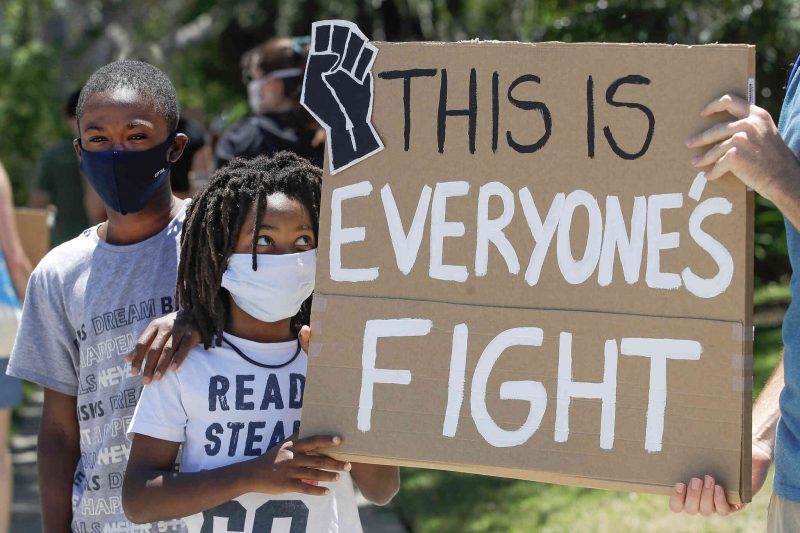 After a “Reckoning,” in 2021 America Looked Away From Racism. By Janell Ross / Time
After a “Reckoning,” in 2021 America Looked Away From Racism. By Janell Ross / Time
This, the second year of a pandemic, is in many ways a singular time in history. But when it comes to inequality, 2021 is also a year like so many others—a year in which, despite a preceding season of promises and apologia, little of substance has changed. Racial inequality and discrimination are features of American normalcy. So this country that only one year before declared itself awake to inequality found it only too easy to look away. The survey, from the Making Caring Common Project at Harvard University’s Graduate School of Education, found that while Americans on both sides of the aisle say they rank “uniting the country” as a high priority, “many Americans don’t appear to have substantial concern for people who are different from them in background and character.” Read more
Political / Social
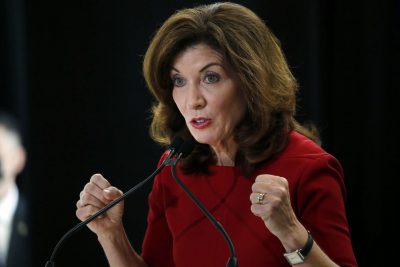 New York governor declares racism ‘public health emergency’ amid new anti-discrimination legislation. Alfonseca / ABC News
New York governor declares racism ‘public health emergency’ amid new anti-discrimination legislation. Alfonseca / ABC News
New York Gov. Kathy Hochul has declared racism a “public health crisis,” signing an entire package of legislation Dec. 23 aimed at addressing discrimination and racial injustice in the state. “For far too long, communities of color in New York have been held back by systemic racism and inequitable treatment,” Hochul said in a statement last week. “I am proud to sign legislation that addresses this crisis head-on, addressing racism, expanding equity, and improving access for all.” Read more
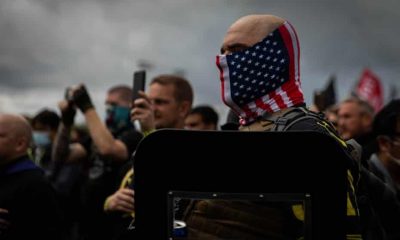 Federal agencies underestimated threat of domestic extremism for years. By Josh Meyer and Kevin Johnson / USA Today
Federal agencies underestimated threat of domestic extremism for years. By Josh Meyer and Kevin Johnson / USA Today
For decades prior to the Jan. 6 insurrection, officials prioritized international terrorism, even as deaths linked to domestic terrorism were rising.
For more than two decades, some federal law enforcement agents, like Murphy, have sounded alarms about the evolving threat posed by right-wing extremists in America. The FBI, the lead agency on domestic terrorism, has issued a steady stream of confidential warnings to state and local law enforcement. Private sector hate-watch analysts have called for reinforcements dozens of times. Yet the U.S. government, under Democratic and Republican administrations, has repeatedly underestimated or failed to recognize the growing danger. Under Donald Trump, the menace was inflamed by a president who aligned himself with far-right figures and conspiracy theorists and actively courted their support. Read more
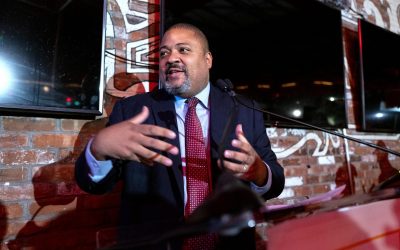 Alvin Bragg sworn in as Manhattan DA, taking over Trump case. By Michael B. Sisak / ABC News
Alvin Bragg sworn in as Manhattan DA, taking over Trump case. By Michael B. Sisak / ABC News
Alvin Bragg has already notched one historic first, taking office Saturday as Manhattan’s first Black district attorney. Now he’s weighing another: whether to make Donald Trump the first former president ever charged with a crime. As district attorney, Bragg inherited an investigation into Trump and his business practices from his predecessor, Cyrus Vance Jr., who declined to seek reelection last year after 12 years in the high-profile job. Read more
Related: Eric Adams sworn in as New York City mayor. By Alanne Orjoux and Devan Cole / CNN
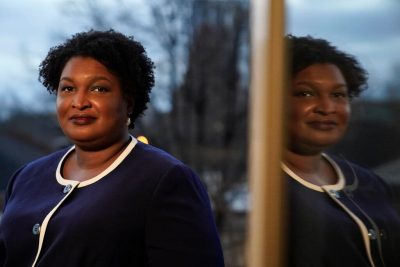 Left and Center-Left Both Claim Stacey Abrams. Who’s Right? By Astead W. Herndon / NYT
Left and Center-Left Both Claim Stacey Abrams. Who’s Right? By Astead W. Herndon / NYT
To left-leaning Democrats, Stacey Abrams, who is making her second run for Georgia governor, is a superstar: a nationally recognized voting-rights champion, a symbol of her state’s changing demographics, and a political visionary who registered and mobilized tens of thousands of new voters — the kind of grass-roots organizing that progressives have long preached. “I don’t think anyone could call Stacey Abrams a moderate,” said Aimee Allison, the founder of She the People, a progressive advocacy group for women of color. Moderates would beg to differ. They see Ms. Abrams as an ally for rejecting left-wing policies that center-left Democrats have spurned, like “Medicare for all,” the Green New Deal to combat climate change and the defunding of law enforcement in response to police violence. Read more
 Virginia Attorney General Sues Town For Alleged Discriminatory Policing. By Sarah Rankin / HuffPost
Virginia Attorney General Sues Town For Alleged Discriminatory Policing. By Sarah Rankin / HuffPost
An investigation showed Black people make up about 22% of Windsor’s population but accounted for about 42% of the department’s traffic stops in a 15-month period.
A small southeastern Virginia town’s police department has operated in a way that led to discrimination against African Americans and violated their constitutional rights, Attorney General Mark Herring alleged in a lawsuit filed Thursday. The court action against the town of Windsor came after an investigation by Herring’s office into its police department. The probe was prompted by a December 2020 traffic stop involving two Windsor Police Department officers and Caron Nazario, an Army lieutenant who is Black and Latino. Read more
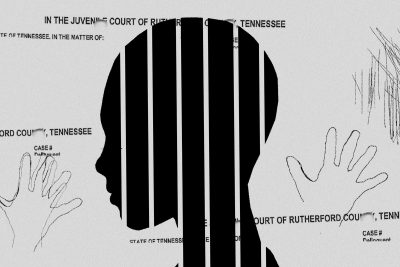 New Documents Prove Tennessee County Disproportionately Jails Black Children, and It’s Getting Worse. By Meribah Knight, , and Ken Armstrong and Hannah Fresques / ProPublica
New Documents Prove Tennessee County Disproportionately Jails Black Children, and It’s Getting Worse. By Meribah Knight, , and Ken Armstrong and Hannah Fresques / ProPublica
Newly obtained reports show that Black children in Rutherford County are locked up more than twice as often as population size would suggest. And as the rest of the country has made progress on racial disparities, the county has gotten far worse.
From July 2010 to June 2021, children from Rutherford County were booked into the juvenile jail at least 6,350 times, according to the youth commission’s monthly monitoring reports. In 38% of those cases, the children were Black. That far eclipses the percentage of children in the county who are Black. That figure stayed between 14% and 16% from 2010 to 2019, according to census data.
 Prosecutors won a conviction in the killing of Daunte Wright. Is this good news or a dangerous precedent for racial justice? By Paul Butler / Wash Post
Prosecutors won a conviction in the killing of Daunte Wright. Is this good news or a dangerous precedent for racial justice? By Paul Butler / Wash Post
Black Lives Matter activists deserve credit for the prosecution of Kimberly Potter, the former Minnesota police officer who was convicted of manslaughter for the death of Daunte Wright, an unarmed Black man killed during a traffic stop. They should be wary, however, of the hardcore strategies prosecutors deployed to win their case. “Lawful but awful” is not the ultimate route to racial justice. The Potter case illuminates a tension at the heart of the Black Lives Matter movement: It wants to reduce the power of prosecutors and undo harsh sentencing regimes that have helped create mass incarceration and vast racial disparities in the U.S. criminal legal system, even as it demands that prosecutors use that system to hold police officers accountable for misconduct. Read more
Related: States Diverge On Police Reforms After George Floyd Killing. By Colleen Slevin / AP and HuffPost
 When A Prison Sentence Of 10 Years And 6 Months Turns Into Forever. Jessica Schulberg / HuffPost
When A Prison Sentence Of 10 Years And 6 Months Turns Into Forever. Jessica Schulberg / HuffPost
Grippen, who had just turned 23, did what his lawyer told him to do. He took the plea deal and went to the Louisiana State Penitentiary, better known as Angola. There, he started counting down the days until he expected to walk free — sometime in the summer of 1981. That day didn’t come until Oct. 5, 2021. By then he was 73 and had spent nearly 70% of his life in prison. There is no record of how many of the 10/6 lifers died in prison. Of roughly 65 who are still alive, the overwhelming majority are Black. Now, after spending decades longer in prison than they were told they would, some of them are finally getting out. Read more
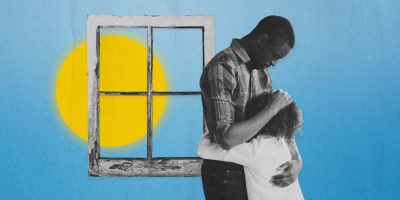 Online learning, racial tensions and ‘the talk’: Black parents raising children amid multiple crises. By Patrice Gaines / NBC News
Online learning, racial tensions and ‘the talk’: Black parents raising children amid multiple crises. By Patrice Gaines / NBC News
Parents say their Black children have had to grow up faster, especially in the post-Trump era, facing issues most white children don’t confront until they’re adults, if at all.
Black parents say 2021 has come with additional challenges, as they’ve also had to confront issues of race, whether it’s helping children explain to their peers why they support the Black Lives Matter movement, or having “the talk” about why Black people are often judged differently than whites and how to act when stopped by police. “As Black parents, we have to constantly advocate for our children,” said Candace Gomez-Broughton, a northern Virginia-based scientist and mother of a 12-year-old daughter and a 10-year-old son. “We’ve had to say, ‘You don’t have the privilege of making mistakes. You have to overcome the biases out there.’ It’s heart-breaking because it shouldn’t make any sense to anyone, but it’s the reality of the situation.” Read more
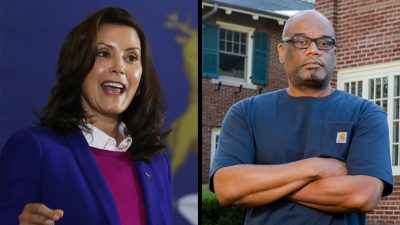 Whitmer signs bill reopening Michigan’s first historically Black college. By Mark Hicks / The Detroit News
Whitmer signs bill reopening Michigan’s first historically Black college. By Mark Hicks / The Detroit News
Gov. Gretchen Whitmer on Tuesday signed legislation to relaunch Michigan’s first historically Black college or university in Detroit. D’Wayne Edwards, the founder of the Pensole Design Academy in Portland, Oregon, recently announced plans to turn the former Lewis College of Business, the state’s first HBCU, which closed in 2013, into a design-focused school. “I am proud to play a part in helping reopen the Pensole Lewis College of Business and Design in Detroit,” Whitmer said in a statement. “I am committed to expanding educational opportunities for Michiganders across our state to put Michigan first.” Read more
Ethics / Morality / Religion (New)
 The Moral Chasm That Has Opened Up Between Left and Right Is Widening. By Thomas B. Edsall / NYT
The Moral Chasm That Has Opened Up Between Left and Right Is Widening. By Thomas B. Edsall / NYT
Over the past four decades, “the United States experienced the most rapid growth in affective polarization among the 12 O.E.C.D. countries we consider” — the other 11 are France, Sweden, Germany, Britain, Norway, Denmark, Australia, Japan, Canada, New Zealand and Switzerland. In other words, whether we evaluate the current conflict-ridden political climate in terms of moral foundations theory, feminism or the political group conflict hypothesis, the trends are not favorable, especially if the outcome of the 2024 presidential election is close.
If the continuing anger, resentment and denial among Republicans in the aftermath of the 2020 presidential contest are precursors of the next election, current trends, in combination with the politicization of election administration by Republican state legislatures, suggest that the loser in 2024, Republican or Democratic, will not take defeat lying down. Read more
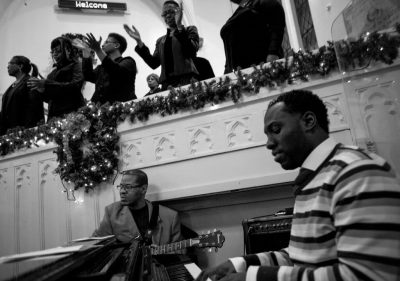 I Grew Up Celebrating New Year’s Eve Like Frederick Douglass. By Esau McCaulley / NYT
I Grew Up Celebrating New Year’s Eve Like Frederick Douglass. By Esau McCaulley / NYT
Watch Night is a tradition in Black churches that began as a way to celebrate the Emancipation Proclamation. For my congregation in Huntsville, Ala., in the 1990s, that meant choirs from Black churches all over the city sang hymns and spirituals. A stream of pastors ascended the pulpit to deliver impassioned sermons. Their aim was to send the congregation into a frenzy of praise and thanksgiving that shook the wooden floors and the stone pillars of the sanctuary. They wanted us to end the year with a shout. Read more
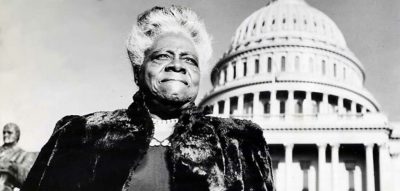 Dr. Bethune’s Last Will & Testament. By Mary Mcleod Bethune / BCU History
Dr. Bethune’s Last Will & Testament. By Mary Mcleod Bethune / BCU History
Sometimes as I sit communing in my study I feel that death is not far off. I am aware that it will overtake me before the greatest of my dreams – full equality for the Negro in our time – is realized. Yet, I face that reality without fear or regrets. I am resigned to death as all humans must be at the proper time. Death neither alarms nor frightens one who has had a long career of fruitful toil. The knowledge that my work has been helpful to many fills me with joy and great satisfaction. Read more
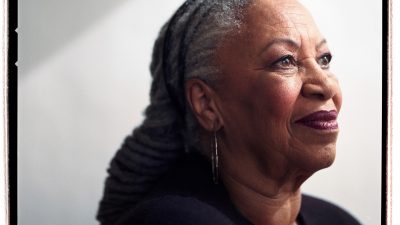 On Toni Morrison, divine feminine power and Afro-Catholicism. By Nadra Nittle / National Catholic Reporter
On Toni Morrison, divine feminine power and Afro-Catholicism. By Nadra Nittle / National Catholic Reporter
After Paradise debuted on Christmas Eve 1997, Morrison recognized that her many accolades wouldn’t prevent critics and scholars from dismissing her seventh novel. After all, she said, the book is “about this unimportant intellectual topic, which is religion.” Paradise takes place (mostly) in the 1960s and ’70s in the fictional all-Black town of Ruby, Oklahoma, established by nine families who in 1890 went on to found yet another all-Black town — Haven, Oklahoma. Ninety miles away from any other municipality, Ruby is a seemingly Black utopia where there’s no crime, drugs, death, or television, and women can take midnight strolls without fear of harm. But Ruby is far from perfect: families adhere to a narrow and dogmatic interpretation of Protestantism and maintain racial purity by coupling with only the darkest of African Americans, even if that means resorting to incest. Read more
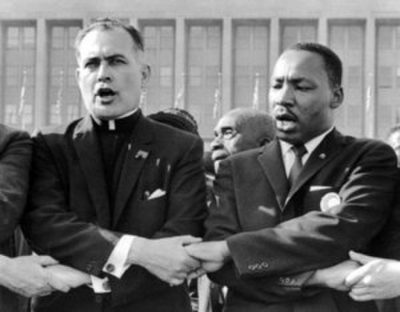 Following Father Theodore Hesburgh through Civil Rights era. By Christopher Booker / Religion and Ethics Newsweekly and PBS NewsHour
Following Father Theodore Hesburgh through Civil Rights era. By Christopher Booker / Religion and Ethics Newsweekly and PBS NewsHour
The new documentary, “Hesburgh,” explores the life of Father Theodore Hesburgh, who served as a long-time president of the University of Notre Dame and is recognized now as one of the most important civic and educational leaders of the 20th Century. Christopher Booker traces Hesburgh’s steps through his priesthood and role as a presidential advisor on civil rights. Watch here
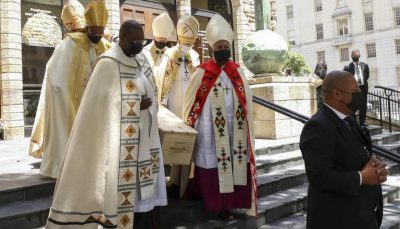 South Africa’s anti-apartheid hero Archbishop Desmond Tutu praised at state funeral. By Reuters and NBC News
South Africa’s anti-apartheid hero Archbishop Desmond Tutu praised at state funeral. By Reuters and NBC News
The state funeral for Archbishop Desmond Tutu, a hero of the struggle against apartheid in South Africa, began on Saturday in St George’s Cathedral, Cape Town, where for years he preached against racial injustice. President Cyril Ramaphosa was delivering the main eulogy for Tutu, who was awarded the Nobel Peace Prize in 1984 for his non-violent opposition to white minority rule. His death on Sunday aged 90 triggered an outpouring of tributes from around the world. “Small in physical stature, he was a giant among us morally and spiritually,” said retired Bishop Michael Nuttall, who served as Tutu’s deputy for many years. Read more
Historical / Cultural
 Lee statue will move to Richmond’s Black History Museum. By Deepa Shivaram / NPR
Lee statue will move to Richmond’s Black History Museum. By Deepa Shivaram / NPR
The massive statue of Confederate Gen. Robert E. Lee in Richmond, Va., taken down in September, will be moved to the city’s Black History Museum, Gov. Ralph Northam and Mayor Levar Stoney announced Thursday. The Black History Museum and Cultural Center of Virginia will take the 21-foot-tall statue of Lee and the pedestal it stood on, which became a rallying point for protests against police brutality in the summer of 2020. Eight other Confederate statues that were removed around the city will also be moved to the museum. Read more
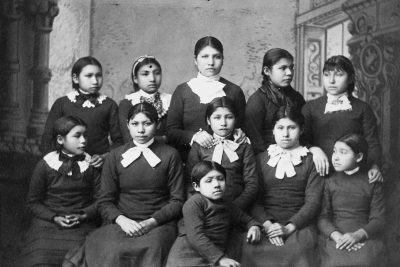 Former boarding school for Indigenous children owning up to its past. By Peter Smith / NCR
Former boarding school for Indigenous children owning up to its past. By Peter Smith / NCR
Middle schooler Rarity Cournoyer stood at the heart of the Red Cloud Indian School campus and chanted a prayer song firmly and solemnly in the Lakota language — in a place where past generations of students were punished for speaking their mother tongue. Her classmates stood around her at a prayer circle designed with archetypes of Native American spirituality, with a circular sidewalk representing a traditional medicine wheel, crossed by sidewalks pointing to the four cardinal directions. Such scenes would have been hard to imagine here decades ago when Holy Rosary Mission — as the Catholic K-12 school was then named — formed part of a network of boarding schools across North America where generations of Indigenous children were brought to weaken their bonds to tribe and family and assimilate them into the dominant white, English-speaking, Christian culture. Read more
Related: Wampanoag, who helped Pilgrims survive, win rights to tribal lands. By Dana Hedgpeth / Wash Post
Related: Tribes Fear a Repeat of the Past. By Jack Healy and Mike Barber / NYT
 Civil rights leaders of 1961 about resisting injustice today. By Mike Thompson / USA Today
Civil rights leaders of 1961 about resisting injustice today. By Mike Thompson / USA Today
My heroes are now in their 70s and 80s. That may seem like a strange thing to say given our youth-obsessed culture, but a 10-day road trip over the summer, during which I interviewed veterans of the fight for civil rights in 1961, convinced me that courage is the greatest superpower and that lessons learned 60 years ago can guide the fight against voting restrictions today. Imagine the American South circa 1961. The Ku Klux Klan and white citizens’ councils called the shots and enforced, through deadly terror, a system of racial segregation that stained everything from the law to customs. Any Black person who dared to buck the system risked their life. And countless Black people were beaten, raped and murdered during that era for challenging the white establishment. Read more
 Wrongfully Accused: The Exoneration of Black People. By Noah A. McGee / The Root
Wrongfully Accused: The Exoneration of Black People. By Noah A. McGee / The Root
In 2021, a total of 132 people received exonerations: 81 of them were Black. Just a decade ago in 2011, only 40 Black people were exonerated. Since 1989 there’s been a 1,057 percent increase in the number of Black people released from prison because they were wrongfully convicted. Of the high-profile exonerations in 2021, the Groveland Four (a group of Black men convicted of kidnapping and raping a White teenager in 1949, including Kevin Strickland, Anthony Broadwater and Muhammad A. Aziz) were among the most celebrated. Are these high-profile exonerations a coincidence? Is it because innocence organizations have more resources? Did the aftermath of George Floyd contribute? Read more
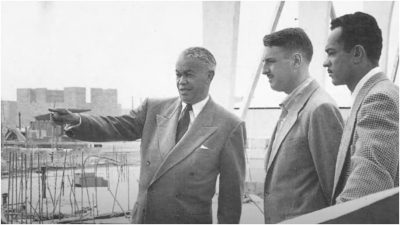 Legacy of Black architect Paul Williams is not new but it’s worthy of celebration all the same. By Lauren Floyd / Daily Kos
Legacy of Black architect Paul Williams is not new but it’s worthy of celebration all the same. By Lauren Floyd / Daily Kos
Having lived in California for about half a decade, I’m embarrassed to write that I only learned of Paul Revere Williams when I came across a social media post about him circulating Twitter and Facebook decades after his death. The post, confirmed by KABC, reads: “Paul Williams was a Black architect who learned to draw upside down so he could sit across from clients, as many of them in the 1920’s wouldn’t sit next to him. He wanted to prove himself that he ‘deserved a place in the world,’ and went on to win numerous awards and design houses for Frank Sinatra and Lucille Ball, built in neighborhoods he wasn’t even allowed to live in.” Like many of our ancestors’ stories, his has been kept out of the history books. But I would argue the greater tragedy than not knowing about Williams is to know and do nothing to educate the next generation of Black people who might be tempted to think their entire history is slavery. It simply is not. Read more
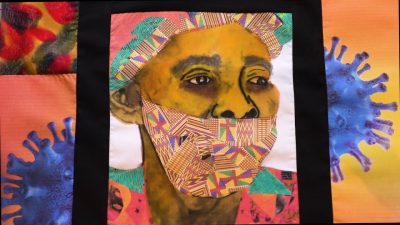 Every stitch tells a story: A Black quilter confronts injustice. By Jingnan Peng / CSM
Every stitch tells a story: A Black quilter confronts injustice. By Jingnan Peng / CSM
For generations of Black women, quilting has been a way to tell stories and protest injustice. In this video, we profile a world-renowned quilter whose work has taken a new turn as the country wrestles with racism.
The stitches holding the cloth together trace a jagged, zigzag path – a pattern quilter Ed Johnetta Miller has never used before. It represents the shape of her life, she says, as a Black woman living in the United States in 2020. The quilt, which Ms. Miller made after the killing of George Floyd, is part of a new series of African American quilt exhibits opening in Minneapolis. The exhibits showcase a centuries-old tradition among Black women that’s drawing new attention in light of a national conversation on race. Read more
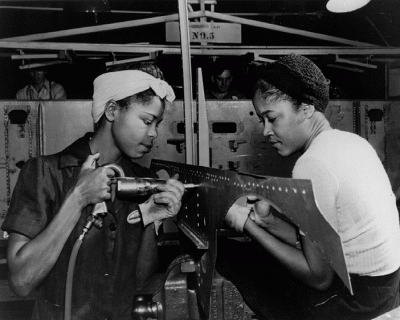 Film honors African American women who were ‘Rosie the Riveters’ during World War II. By Dana Hedgpeth / Wash Post
Film honors African American women who were ‘Rosie the Riveters’ during World War II. By Dana Hedgpeth / Wash Post
Oftentimes people don’t consider Black women as part of World War II,” said Susan King, 97. ‘The focus is always on the men of the war.’
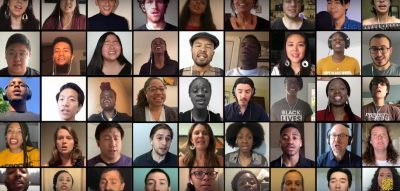 Let us make a musical resolution to lift our voices in harmony in this New Year. By Denise Oliver Velez / Daily Kos
Let us make a musical resolution to lift our voices in harmony in this New Year. By Denise Oliver Velez / Daily Kos
Welcome to 2022. As far as years go, 2021 was not an easy one, and many of us are still mourning loved ones we’ve lost. We’ve faced both fear and depression, given the ongoing pandemic, and are now being challenged by yet another wave of disease. No matter the obstacles we face in the year ahead, we must remember that other generations had troubles as well. Our ancestors survived, leaving us with a gift that transcends both time and trouble: The gift of music. Music that inspires. Music that heals. Music that challenges us to do better. Music that gives us the strength to soldier on, and when necessary, to fight back. Read more
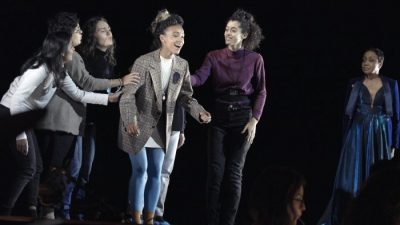 Wayne Shorter and Esperanza Spalding: a dream collaboration for ‘Iphigenia’. By Sharon Brooks / The Undefeated
Wayne Shorter and Esperanza Spalding: a dream collaboration for ‘Iphigenia’. By Sharon Brooks / The Undefeated
Wayne Shorter and Esperanza Spalding came together to disrupt the way we have imagined classical and jazz forms in their new opera, Iphigenia in Aulis. The story is based on the ancient Greek play by Euripides about Agamemnon and his decision to sacrifice his daughter, Iphigenia, to appease the goddess Artemis. The music is performed by a 28-piece chamber ensemble, a cast of nine vocalists, including Spalding, and a chorus of 10 singers. It features Shorter’s groundbreaking method of symphonic improvisation and highlights Spalding’s poetic libretto. The music takes the audience from ancient days to the modern era, and uses the myth to disrupt misogynistic narratives imposed upon female characters. Architect Frank Gehry created the set design and the production was directed by Lileana Blain-Cruz. Read more
 Issa Rae’s Insecure’s final season leaves a lasting legacy. By Nylah Burton / Vox
Issa Rae’s Insecure’s final season leaves a lasting legacy. By Nylah Burton / Vox
Insecure has a solid place in TV history. Following Wanda Sykes’s 2003 premiere of Wanda at Large on Fox, Insecure — which was co-created by Larry Wilmore — is only the second show created by and starring a Black woman. The friendship at the center of it was significant, too. We so rarely get to see a show with two dark-skinned Black women leads, let alone two Black women who love each other deeply. While there have been other shows — Being Mary Jane, Girlfriends, Living Single — that captured elements of these experiences, the characters were so often fully formed, already excellent and unchanging. On Insecure, Issa, Molly, Tiffany (Amanda Seales), and Kelli (Natasha Rothwell) were becoming. They were something previously unseen: valuable, lovely, worthy Black works in progress. Read more
Sports
 Desmond Tutu understood how sports and politics intertwined. By Kevin Blackstone / Wash Post
Desmond Tutu understood how sports and politics intertwined. By Kevin Blackstone / Wash Post
For just a few years after Tutu in 1984 was awarded the Nobel Peace Prize for becoming the immutable voice against the savage minority White South African regime, which for generations brutally suppressed the country’s Black majority, Tutu took aim at sports for propagandizing that viciously inhumane system called apartheid. Specifically, he lashed out at cricket. Tutu came to understand sports and politics as inextricably woven together and the games we play as perfect platforms from which to advocate for and produce societal change. Read more
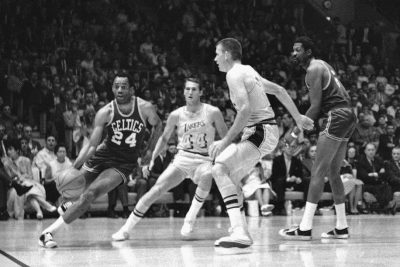 Sam Jones, a core member of the great 1960s Celtics, was a great shooter. And a lot more. By John Feinstein / Wash Post
Sam Jones, a core member of the great 1960s Celtics, was a great shooter. And a lot more. By John Feinstein / Wash Post
 I Investigated Bonds and Clemens. Yes, They Belong in Cooperstown. By Jeff Novitzky / NYT
I Investigated Bonds and Clemens. Yes, They Belong in Cooperstown. By Jeff Novitzky / NYT
Friday is the last day for voters in the Baseball Writers’ Association of America to submit their 2022 Baseball Hall of Fame ballots. Listed on those ballots are two players in their 10th and final year of Hall of Fame eligibility who truly dominated their era but haven’t been voted in: Barry Bonds and Roger Clemens. The two men should be in the Hall of Fame. Undoubtedly, this is because toward the end of their careers, both men faced allegations that they had used performance-enhancing drugs (P.E.D.s) banned by their sport. I’ve come to this conclusion: Bonds and Clemens played at a time when the widespread abuse of P.E.D.s in baseball was a result of a collective failure — of Major League Baseball, teams, players, the players’ union, the media and even the fans. Read more
Site Information
Visit our home page for more articles, book/podcast and video favorites. And at the top of this page register your email to receive notification of new editions of Race Inquiry Digest. Click here for earlier Digests.
About Race Inquiry and Race Inquiry Digest. The Digest is published on Mondays and Thursdays.
Use the buttons below to share the Digest in an email, or post to your Facebook, Linkedin or Twitter accounts.